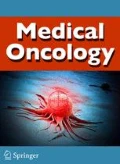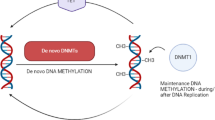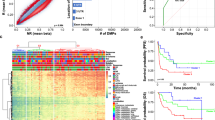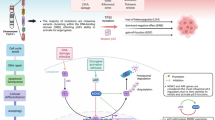Abstract
To study the role of SHP-1 methylation in the pathogenesis of myelodysplastic syndromes (MDS), we detect the methylation status of SHP-1 promoter and STAT3 phosphorylation of MDS patients by the methylation-specific PCR and Western blotting, respectively. It is found that the methylation rate of SHP-1 promoter of high-risk MDS patients (69.2%) was higher than that of the low-risk MDS patients (21.4%) (P = 0.001). The expression rate of STAT3 phosphorylated protein of high-risk group was higher (66.7%), when compared with that of the low-risk group (18.2%) (P = 0.0001). Correlation analysis showed that the methylation status of SHP-1 promoter is positive correlated with the expression of phosphorylated STAT3 in MDS patient (P < 0.001, r = 0.55). Interestingly, in high-risk group, the Kaplan–Meier analysis showed that the 3-year overall survival rate of high-risk MDS patients with SHP-1 methylation was lower than that of patient without SHP-1 methylation (25% vs. 61%) (P = 0.033). In summary, it is indicated that the SHP-1 methylation plays important role in the pathogenesis of MDS via activating the JAK/STAT pathway probably and the methylation of SHP-1 promoter is a useful prognostic factor for high-risk MDS patient, with the characteristic of higher methylation lower survival rate.






Similar content being viewed by others
References
Vardiman JW, Thiele J, Arber DA, Brunning RD, Borowitz MJ, Porwit A, et al. The 2008 revision of the World Health Organization (WHO) classification of myeloid neoplasms and acute leukemia: rationale and important changes. Blood. 2009;114:937–51.
Jones PA, Baylin SB. The fundamental role of epigenetic events in cancer. Nat Rev Genet. 2002;3:415–28.
Lin J, Yao DM, Qian J, Wang YL, Han LX, Jiang YW, et al. Methylation status of fragile histidine triad (FHIT) gene and its clinical impact on prognosis of patients with myelodysplastic syndrome. Leuk Res. 2008;32:1541–5.
Wu SJ, Yao M, Chou WC, Tang JL, Chen CY, Ko BS, et al. Clinical implications of SOCS1 methylation in myelodysplastic syndrome. Br J Haematol. 2006;135:317–23.
Aggerholm A, Holm MS, Guldberg P, et al. Promoter hypermethylation of p15INK4B, HIC1, CDH1, and ER is frequent in myelodysplastic syndrome and predicts poor prognosis in early-stage patients. Eur J Haematol. 2006;76:23–32.
Grovdal M, Khan R, Aggerholm A, et al. Negative effect of DNA hypermethylation on the outcome of intensive chemotherapy in older patients with high-risk myelodysplastic syndromes and acute myeloid leukemia following myelodysplastic syndrome. Clin Cancer Res. 2007;13:7107–12.
Wu C, Sun M, Liu L, Zhou GW. The function of the protein tyrosine phosphatase SHP-1 in cancer. Gene. 2003;306:1–12.
Bowman T, Garcia R, Turkson J, Jove R. STATs in oncogenesis. Oncogene. 2000;19:2474–88.
Bromberg J. Stat proteins and oncogenesis. J Clin Invest. 2002;109:1139–42.
Oka T, Ouchida M, Koyama M, Ogama Y, Takada S, Nakatani Y, et al. Gene silencing of the tyrosine phosphastase SHP1 by aberrant methylation in leukemias/lymphomas. Cancer Res. 2002;62:6390–4.
Chim CS, Fung TK, Cheung WC, Liang R, Kwong YL. SOCS1 and SHP1 hypermethylation in multiple myeloma: implications for epigenetic activation of the Jak/STAT pathway. Blood. 2004;103:4630–5.
Zhang Q, Raghunath PN, Xue L, Majewski M, Carpentieri DF, Odum N, et al. Multilevel dysregulation of STAT3 activation in anaplastic lymphoma kinase-positive T/null-cell lymphoma. J Immunol. 2002;168:466–74.
Yasukawa H, Sasaki A, Yoshimura A. Negative regulation of cytokine signaling pathways. Annu Rev Immunol. 2000;18:143–64.
Levy DE, Darnell JE Jr. Stats: transcriptional control and biological impact. Natl Rev Mol Cell Biol. 2002;3:651–62.
Hsiao JR, Jin YT, Tsai ST, Shiau AL, Wu CL, Su WC. Constitutive activation of STAT3 and STAT5 is present in the majority of nasopharyngeal carcinoma and correlates with better prognosis. Br J Cancer. 2003;89:344–9.
Schuringa JJ, Wierenga AT, Kruijer W, Vellenga E. Constitutive Stat3, Tyr705, and Ser727 phosphorylation in acute myeloid leukemia cells caused by the autocrine secretion of interleukin-6. Blood. 2000;95:3765–70.
Acknowledgments
This work was supported by grants from the National Natural Science Foundation of China (30672208 and 81100337).
Conflict of interest
All authors have no conflict of interest.
Author information
Authors and Affiliations
Corresponding author
Additional information
Yizhuo Zhang, Dandan Zhao and Haifeng Zhao are contributed equally to this manuscript.
Rights and permissions
About this article
Cite this article
Zhang, Y., Zhao, D., Zhao, H. et al. Hypermethylation of SHP-1 promoter in patient with high-risk myelodysplastic syndrome and it predicts poor prognosis. Med Oncol 29, 2359–2363 (2012). https://doi.org/10.1007/s12032-012-0163-6
Received:
Accepted:
Published:
Issue Date:
DOI: https://doi.org/10.1007/s12032-012-0163-6




